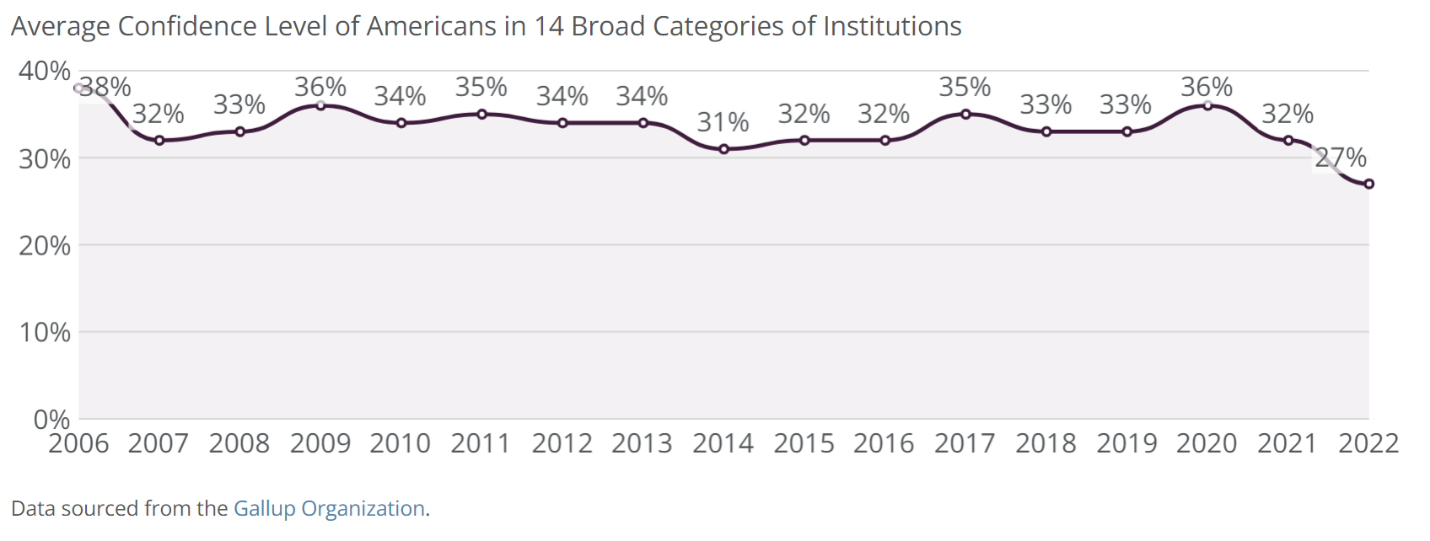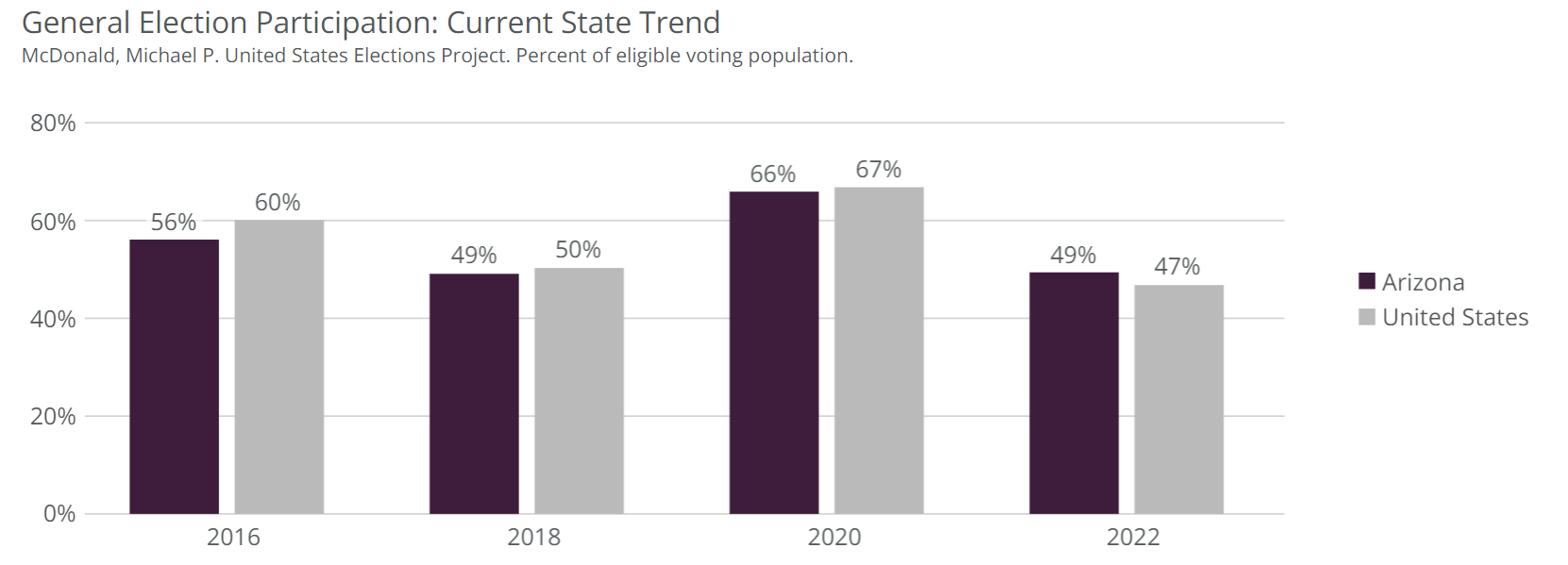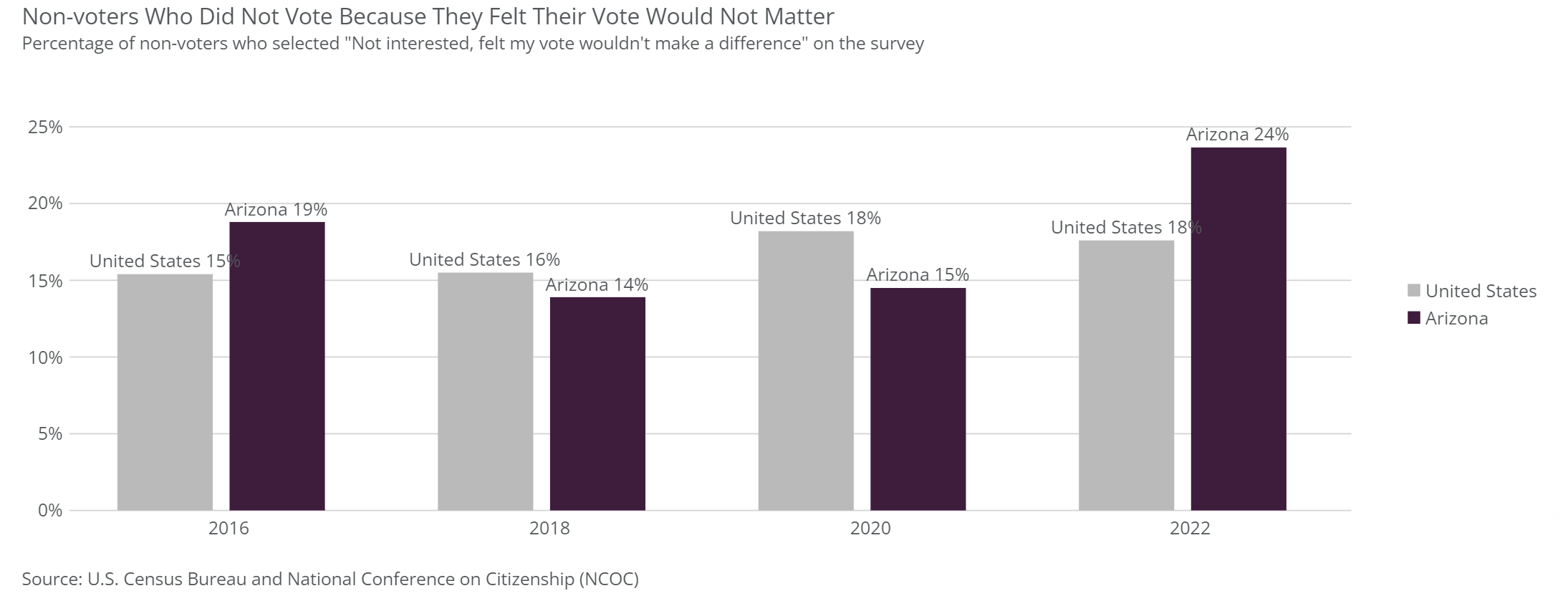Arizona Progress Meter Update: Civic Health

Recent Data Show Declines in Belonging and Community Engagement for Arizonans; Participation in Elections Relatively High, While Political Disengagement is Apparent
We know that civic health is foundational to our community and individual well-being. Recent data from CFA’s latest Gallup Arizona Survey revealed that Arizonans share a public value of greater civic engagement and democracy that works for all. The survey also revealed significant concerns in the state’s civic life, as Arizonans have low confidence in their elected leaders to be responsive, data-driven, and forward-thinking. Only 33 percent of Arizonans believe our leaders represent diverse voices, and just 26 percent see leaders working across party lines. While civic health remains a priority for Arizonans, there are significant gaps in who participates and how.
Recent data in the updated Arizona Civic Participation and Connected Communities Progress Meters, which assess the state's civic health, illuminate challenges and opportunities in civic life. Nationally, confidence in institutions is at an all-time low, with only an average of 27 percent of U.S. residents saying they have confidence in 14 categories, including military, police, church or organized religion, medical system, presidency, U.S. Supreme Court, public schools, banks, organized labor, criminal justice system, television news, newspapers, big business, and Congress (Figure 1).

Figure 1: Nationally, confidence in institutions is down to the lowest level in years with an average of only about one-fourth of Americans having confidence.
Among other indicators, the share of Arizonans who contact public officials and discuss politics among family and friends is stable at 9 percent and 30 percent, respectively. However, Arizona lags behind the nation in these critical areas that impact how we share information and make our voices heard in our democracy.
Additional findings from the Arizona Civic Participation Progress Meter include:
- Arizonans are more likely to boycott or buy products as a signal of their approval or disapproval of the values of the company or product than their peers across the nation. In 2021, about 20 percent of residents said they had leveraged their buying power this way, versus 17 percent of U.S. residents.
- Interestingly, while boycotting was initially seen with younger Arizonans, in more recent years, older age groups have caught up and now practice this at a similar rate.
- Across civic participation indicators, there are dramatic shifts in participation across age and income. Generally, people who are older and more affluent participate in more significant numbers.
We know that Arizonans also want elections to be convenient, accessible, fair, and secure and that these are critical pathways for our communities to make our voices heard and to create more responsive leadership and governance. The past several years show encouraging trends in increased participation for Arizonans. However, it’s important to note that not everyone eligible to vote participates, and the reasoning matters.

Figure 2: Election participation among eligible voters has improved from 2016 to 2020. In midterm elections, participation has remained steady.
The U.S. Census Bureau, in their 2023 November Voting Supplement of the Current Population Survey, asks eligible voters who did not participate why they did not participate. Among the possible responses are problems with transportation, dislike of candidates, bad weather, work obligations, travel, registration problems, or lack of interest or perception that their vote doesn’t matter.
The response of believing one’s vote does not matter is tracked in the Arizona Civic Participation Progress Meter because it indicates engagement, interest, and confidence in our institutions. Otherwise, eligible voters who choose not to participate due to a lack of interest or disenchantment with the electoral process can significantly affect election outcomes, resulting in representatives who do not truly represent the community. In the 2016 Presidential Election, 19 percent of non-voting Arizonans felt their vote wouldn't matter, compared to the national average of 15 percent. However, by 2020, this trend shifted, with 15 percent of Arizonans citing this reason for not voting, while the national rate was higher at 18 percent. According to recent data for the 2022 elections, the percentage of eligible Arizonans abstaining from voting due to disinterest or a perceived lack of impact jumped to 24 percent, a notable increase compared to the 16 percent in the midterm election in 2018.

Figure 3: Non-voters who cite “Not interested/ Vote won’t make a difference” as the reason they didn’t vote. As of 2022, Arizona non-voters are now more likely to cite a belief that their vote doesn’t matter than in recent election years. The U.S. as a whole is more stable though the number has increased in recent years.
Connected Communities provide another insight into how Arizonans come together to solve problems, build relationships, and create more resilient communities. Among Connected Communities indicators, Arizona is much more challenged with declines across three of the five indicators.
- In 2021, Arizonans who say they volunteered in the past year declined to 16 percent from 26 percent in 2019.
- Smaller but noticeable declines were seen in spending time with neighbors, where only 21 percent of Arizonans regularly spend time or talk with neighbors as compared with 23 percent in 2019, and in working with neighbors to do something positive for the community which is down to 16 percent in 2021 from 18 percent in 2019.
- While U.S. residents saw a 10-point decline in those belonging to groups, organizations, or associations, Arizona’s decline was only one point from 2019 to 2021.
- Charitable giving has held steady in Arizona since 2017, with about half of residents giving to worthy causes each year.
- As with civic participation, older Arizonans have higher levels of connectedness than younger residents.
Identifying opportunities to strengthen civic health and ultimately move the needle on indicators included in the Arizona Progress Meters that measure civic health is core to CFA’s work. We lead the Arizona Civic Life Partnership with the Arizona Center for Civic Leadership at The Flinn Foundation. The partnership activates this data by convening partners from across the state to strengthen civic health. CFA is also deeply committed to building the next generation of active civic participants through the School Participatory Budgeting initiative. Through this project, students learn democracy by doing and make decisions about how a portion of their school budget is spent to improve their campus communities. SPB is engaging 75,000 students statewide, leading to 6,500 new voter registrations. Together, we can improve the lives of Arizonans and see a future where we’re engaged in civic activities and connected to our communities.
About Our Data Sources
As with all the Arizona Progress Meters, data are publicly available from a trusted and regularly updated source. Data used in these metrics come from the U.S. Elections Project, the Gallup Organization, and the National Conference on Citizenship analysis of U.S. Census data.
